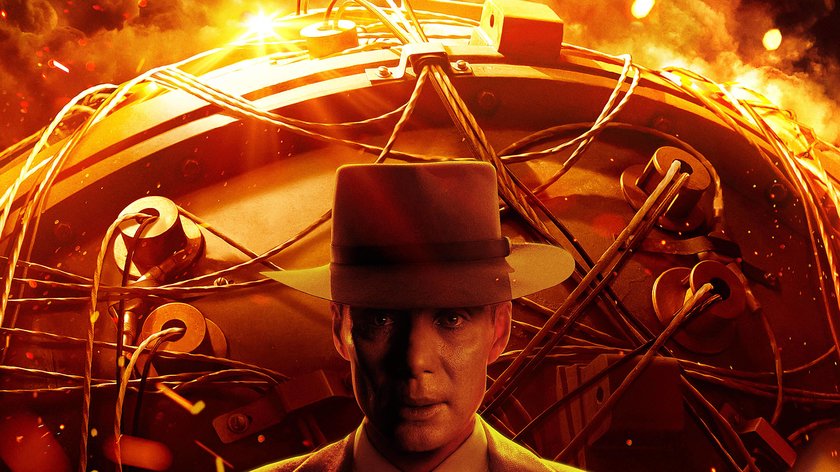
When Christopher Nolan releases a new film, it is, by definition, a cinema highlight of the year. But can the director build on his celebrated works with “Oppenheimer“?
A biopic about a physicist that’s three hours long and has a lot of black and white scenes? On paper, that really doesn’t sound like a box-office hit, but this isn’t about just any physicist, and the film isn’t the responsibility of just anyone either: “Oppenheimer” is about the “father of the atomic bomb” of the same name, and none other than Christopher Nolan is setting a cinematic monument.
The name of Christopher Nolan alone should sell a number of tickets due to his filmography; after all, nobody in recent years has understood so well how to combine blockbusters with sophisticated cinema. For the second time since Dunkirk, the director of The Dark Knight and Inception delves into World War II and tells the story of J. Robert Oppenheimer, leader of the Manhattan Project that produced the world’s first atomic bombs. Our reviews will tell you whether you should definitely see “Oppenheimer” in German cinemas from July 20, 2023. And if you’re still craving more classic Nolan Twist movies, here are a few tips for you:
Four Nolan works have been among my 30 favorite films for years, and with “Memento,” I even think the best film ever comes from the British director. My opinion of his qualities is correspondingly high, and I was correspondingly excited about his latest work – and I’m correspondingly disappointed now because “Oppenheimer” is Christopher Nolan’s worst Hollywood production for me.
That’s not to say the film is a disaster; it even has some gripping passages. However, “Oppenheimer” suffers from the same problem as pretty much all biopics that weren’t written by Aaron Sorkin (“The Social Network,” “Steve Jobs”): We rush through the most important stations in a character’s life, which means that individual scenes can hardly breathe, and the characters themselves remain pale and superficial because they are either busy with explanations or recite terrible dialogues that summarize all the important cornerstones of their existence in as few sentences as possible. And since Nolan has been known for years for not being able to write human, emotional dialogue, he unfortunately seems completely out of place as the author of a biopic, as he only exacerbates these weaknesses of the genre.
Nolan hasn’t done himself any favors by taking on so much in Oppenheimer either. After the first hour, which, for me, was by far the weakest, rushing through the beginnings of Robert Oppenheimer’s career in physics and his relationships, the start of the Manhattan project brings some focus and thus momentum, especially since Matt Damon’s character finally brings some life into the matter. However, the film can never fully devote itself to the colossal dimensions of this undertaking, since at the same time, we repeatedly see excerpts from the later life of Robert Oppenheimer, who has to fight for his reputation there. After all, Nolan unsurprisingly doesn’t feel like the linear narrative style typical of biopics. The time after the Manhattan project, in turn, deals with the last hour of the film, which is the strongest phase for me, and I wish Nolan had only devoted himself to this part. Here an exciting conflict unfolds about vanities in science and about dealing with one’s own potentially devastating achievements.
You could easily have made three films out of all this, and for me even had to, to really do justice to all aspects – and this army of different characters that are unleashed on us here. A familiar face awaits us right down to the smallest supporting role, which unfortunately often tore me out of the experience instead of enriching it. If Nolan weren’t such an enemy of streaming, he could have crafted a Chernobyl-style miniseries masterpiece (stream here on WOW) from all of this. So we get a technically bombastic cinema experience, which impresses once again, especially in terms of sound design – but at the same time, the content is painfully flat for me and makes me ask: Was it really worth it?
Anne: A Memorable Biographical Thriller
Academic biographies have always held a special attraction for me, even if not many of them stick in my memory – “Oppenheimer” is quite different.
With his powerful imagery and sound, Christopher Nolan draws us into the impressive world of physics from the very first minute – sometimes calm, still, and quiet, but sometimes also brutal and impetuous. In addition to capturing the mood of the science scene of the 1920s and 1930s, “Oppenheimer” is able to paint a multi-layered, unsparing, but also vulnerable picture of the eponymous protagonist, including private misconduct, arrogance, and the subsequent fall, followed by moral catharsis. Embedding Oppenheimer’s career into the rehabilitation hearing was a nerve-wracking gimmick, even if the time jumps involved were at times not easy to follow.
Irrespective of this, “Oppenheimer” captivated me for three full hours, impressed me, made me smile in the right places, instilled fear in me, and finally left me with a queasy feeling. Anyone who feels up to this emotional roller coaster ride should not miss this dark biographical thriller.
Mira: Unfortunately, the trailer is more exciting
With “Oppenheimer,” Christopher Nolan has once again delivered an audio-visually impressive work that should definitely be seen in the cinema to unfold its full effect. The images and the Nolan-typical sound design let the viewer penetrate deep into the psyche of Robert Oppenheimer, who is masterfully played by Cillian Murphy.
Unfortunately, I had the feeling that Nolan lost himself in his own pictures and completely forgot about the viewers. The result is a much too long film that keeps getting going but can’t keep up the suspense. The overwhelming number of characters, embodied by well-known actors*, who disappear just as quickly as they appeared, contributes to the fact that I could never really get into the world that “Oppenheimer” paints.
In the end, despite the fabulous pictures, the lack of flow also affects the discussion of the content of the dangers of the atomic bomb and the responsibility of the scientists. Unfortunately, the trailer managed to convey this threat more vividly than the film itself.
Olli: The biopic as an explosive fairground attraction
When it was announced that Christopher Nolan was working on a biopic about one of the most famous scientists in recent human history after “Tenet,” I was skeptical at first. After all, in my perception, the characters and their inner life always receded into the background in most of the works by the 52-year-old director. For me, the fascination always lay in the mixture of a creative idea, the sophistication of the story, and the audiovisual bombast. I looked in vain for the first two aspects of “Oppenheimer,” while the last-mentioned bombast is present to a minor degree, but in this film, it finally advances to Christopher Nolan-style hyperbole.
For example, physical phenomena are discussed, while abstractions cut in between are accompanied by explosive sounds and make the audience flinch in the cinema seat like in a ghost train. And then there are the dialogues, which rarely do without the use of menacing bass lines, which often drew my attention from the seriousness of the situation to the theatrical, almost ridiculous aura of the production.
That’s why “Oppenheimer” seemed to me mostly like a filmed play, which is based on a literary template and which was decked out with Nolanesque effects. Like double physics, followed by double politics. Only in the final third, when the film focuses on interpersonal issues such as the intriguing relationships among scientists during the Manhattan Project, does “Oppenheimer” really pick up speed. At this point, however, the film had already lost me, so that at the end of the day, I walked out of the cinema with only a slight disappointment and the following question: Was Christopher Nolan really the right man for this type of film?
Philipp: If only the atomic bomb didn’t exist…
Christopher Nolan, the man behind “The Dark Knight,” “Inception,” and “Interstellar,” takes on an almost classic biopic about scientist J. Robert Oppenheimer. Where is the potential for Nolan’s blockbuster, which will keep us busy long after the cinema? It is “only” the life story of a man who played a key role in the development of the atomic bomb.
If you take up this point, you get closer to Nolan’s approach; after all, the testing and use of the atomic bomb can be staged in a visually stunning way. “Without CGI recording,” was the news when the sequence in the film was already reported in advance. However, I found it difficult to imagine making a three-hour film out of it. And so it also happened that the entire cinematic narration around this storyline was unfortunately a bit too long-winded and stretched out for me.
The moral dilemma, which, to be fair, kept Oppenheimer busy throughout his life, was neglected in view of its relevance in the life of the scientist. On the other hand, the film gains momentum, excitement, and a positive impression every time the political construct surrounding the Manhattan Project, Oppenheimer, and his involvement in communist activities is dealt with. Then “Oppenheimer” becomes a fascinating “court drama” that tells me more than a Wikipedia entry about the person.
And then Nolan’s staging with his changes of perspective comes into its own, for example when we are allowed to watch the game about Oppenheimer’s demotion and later rehabilitation, and the theoretical process of developing the atomic bomb recedes into the background. All in all, unfortunately, not a strong Nolan film, but in his political study – which he could have shortened by an hour – a work worth seeing.




